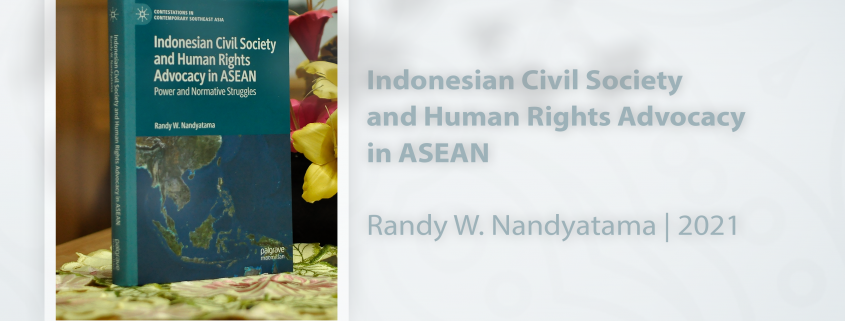Bincang ASEAN on Book Discussion | Indonesian Civil Society and Human Rights Advocacy in ASEAN
On Friday, 12th October 2021, ASEAN Studies Center Universitas Gadjah Mada held a Bincang ASEAN on Book Discussion. The discussion took place online by Zoom and streamed on ASEAN Studies Center Facebook page at 13.00 GMT. In this Bincang ASEAN, ASC UGM hosts a discussion on the Indonesian Civil Society and Human Rights Advocacy in ASEAN book authored by Dr. Randy W. Nandyatama.
 The discussion has invited Dr. Randy W. Nandyatama as the book’s author and senior researcher at ASEAN Studies Center UGM. Furthermore, several academicians and practitioners on human rights advocacy were also invited to enliven the discussion. H. E Yuyun Wahyuningrum as Representative of Indonesia at AICHR and Senior Advisor at HRWG, Assoc. Prof. Anthony J. Langlois as an Associate Professor from College of Business, Government, and Law at Flinders University, and Asst. Prof. Deepak Nair as Assistant Professor of the Political Science National University of Singapore. The discussion was moderated by Yulida Nuraini Santoso as the Managing Director of ASEAN Studies Center UGM.
The discussion has invited Dr. Randy W. Nandyatama as the book’s author and senior researcher at ASEAN Studies Center UGM. Furthermore, several academicians and practitioners on human rights advocacy were also invited to enliven the discussion. H. E Yuyun Wahyuningrum as Representative of Indonesia at AICHR and Senior Advisor at HRWG, Assoc. Prof. Anthony J. Langlois as an Associate Professor from College of Business, Government, and Law at Flinders University, and Asst. Prof. Deepak Nair as Assistant Professor of the Political Science National University of Singapore. The discussion was moderated by Yulida Nuraini Santoso as the Managing Director of ASEAN Studies Center UGM.
Dr. Randy W. Nandyatama enlightens up the discussion by starting a presentation in regards to the book. He divided the presentation into four parts: the central puzzle, analytical framework, the book’s main points, and revisiting the institutionalism of Human Rights in ASEAN. In the presentation, Dr. Randy stated that it is essential to increase and push conventional constructivism into something much more critical since the real commitment is for dissecting the myths associated with the norms dynamics. Dr. Randy also has in regards to Indonesian CSOs in the field of ASEAN. Further, Dr. Randy concluded his presentation on the book by revisiting the institutionalism of Human Rights in ASEAN that three unique patterns consist of supportive, critical, and adaptive. These three notable patterns contribute to nuanced normative struggle in Indonesia’s regional human rights issues and the ASEAN human rights institutionalization process.
H.E. Yuyun Wahyuningrum has also stated her opinion regarding the books; she agrees that the books are fascinating. She also indicated her agreement on the ideas of how civil society has helped to engage ASEAN. Perhaps she stated that this condition might be different in reality, and the implementation of human rights norms in ASEAN results from a long debate. Further, Assoc. Prof. Anthony J. Langlois has also stated that this book’s primary goal is to understand the subsequent progress in the institutionalization of human rights on ASEAN. He also agreed that The existing literature does not explain Civil Society Engagement well, so we didn’t have this vibrant idea. Further, he explained that this book is quite interesting in explaining this. Lastly, Asst. Prof. Deepak Nair has also stated his interest in the upbringing topics of this book. He noted that this book provided us with an account of institutionalism from the bottom-up perspectives and actors’ perspectives beyond actors.
The discussion also became more interesting with the Questions and Answers session with participants of this book discussion. The talk was lively as participants were eager to raise questions on the concept of civil society and the context of Indonesia and ASEAN. The discussion then wrapped up with the statement regarding the importance of keeping up the human rights advocacy in Indonesia and ASEAN essentially.
Report by:
– Citta Azarine A. (Median Intern at ASC UGM)
#ASEAN #SoutheastAsia #ASEANStudiesCenter#ASC #UGM #BincangASEAN #BookDiscussion#HumanRights #Advocacy #CivilSociety #CSO



Leave a Reply
Want to join the discussion?Feel free to contribute!